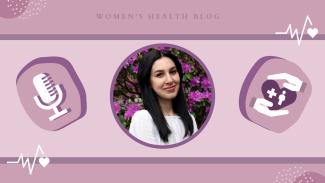Interviewee: Negin Nia, B.A., M.J., University of British Columbia, Author/Editor: Romina Garcia de leon (Blog Co-coordinator).
Published: June 17th, 2022
In this week’s Behind the Science, we highlight work done by our current Blog Co-Coordinator at the Women’s Health Research Cluster (WHRC), Negin Nia. She is a recent Master’s graduate from the UBC School of Journalism who specialized in public health. Negin’s final research project in the program sought to examine the intersection between women’s physical pain, race, and treatment in North America’s hospitals and beyond.
Negin did not only complete a literature review but also released an audio documentary covering the lived experiences of racialized women. Her podcast was recently awarded the 2022 Radio Television Digital News Foundation JJ Richards Award. Read more about her project and the lived experience that drove this work.
Can you please tell me about the work you have done during your Master of Journalism degree?
For the last year in my program, I decided to focus my journalism specialization on health reporting. This work was driven by my lived experience but also because I believe health impacts every aspect of our lives.
I did my final research project, which was a combination of a literature review, and an audio documentary on women’s physical pain, race and treatment. There is a lot of research that shows that women, especially racialized women, experience a heightened degree of discrimination, stigma and dismissal of their physical pain because of stereotypes and biases. This is particularly striking as women already experience more chronic pain than men.
So, the audio documentary explores the lived experiences of many women, including my own story surrounding physical pain, race and accessing treatment across North America's health care systems. And then the final literature review was more of a deep dive into why this is happening. It included the research in the statistics, whereas the audio documentary was more testimony with facts — they complement each other well.
What led you to pursue this work in the field of health?
Back in 2020, I had to undergo open-heart surgery for a benign heart condition that I have had my whole life. The situation caught me by surprise because I was an outwardly healthy, 22-year-old. But I had been having a lot of heart palpitations during that year and the doctors kept telling me it was just my anxiety.
Finally, I got referred to a cardiologist who took such great care of me and took my pain seriously. He scheduled me for an MRI, which is an uncommon test to run for my condition. Usually, it's an echo scan. The MRI showed more than the echo scan did, that my heart condition had all of a sudden become severe with no explanation. I underwent surgery as soon as possible.
That experience was super scary and shocking, but I have come out of it a lot stronger — it taught me so much. And just being in the hospital that week, and talking to other people who have been dealing with chronic health issues, really opened up my eyes to the disproportionate dismissal that women, people of color, and non-binary folk face in the healthcare system.
Do you incorporate the knowledge you gained from your undergraduate degree into what you do now?
I did my undergraduate degree at UBC in political science and law, and it taught me how to develop my writing skills. I also focused a lot on health policy during my degree. I originally wanted to become a lawyer, but after I started writing for the school newspaper, I realized that I love writing and journalism.
That degree equipped me for a lot of what I'm doing now in my work at the WHRC, and it also gave me the skills to pursue my master's degree and the work that has come from it.
What are your next steps, and long-term goals?
I’m very interested in pursuing work that's meaningful, similar to what I did in my podcast. I enjoyed the aspect of sharing stories and highlighting the voices of marginalized and racialized groups — which is my passion. I think that it's really important to do something you're passionate about because it shines through your work.
I'm also currently working at the Women's Health Research cluster as a Blog Co-Coordinator, which has been amazing because it's so enriching. Every week when we post blogs, there's a new topic and I'm constantly learning about women's health issues and people doing amazing work in the health field.
How can people reach you and know more about your work?
My Twitter handle is @_neginnia. My podcast is titled "Let's Talk About: Women's Physical Pain, Race & Treatment," and you can find it on Spotify.
